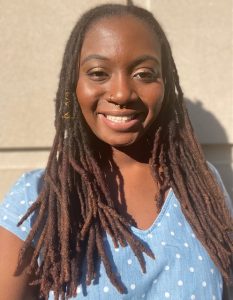
Shikira Thomas, MSPH is a UNC Center for Health Equity Research Research Program Manager.
Why is health equity or health equity research important to you?
Favorable health is a basic right that should be afforded to all, but often is not. Health equity is important because it impacts the survival of so many populations. By extension, health equity research is important to me because it illuminates the disparate treatment of populations and calls for change. While data and statistics are vital when pushing for this change (through policy, funding sources etc.), good health equity research is careful to humanize populations, remembering that they are much more than figures, but are real people with real lives that are impacted by multiple overlapping spheres of oppression.
What path led you to pursue a career in health equity?
I entered Xavier University of Louisiana as a Biology student who was completely set on going to medical school. During an internship after my freshman year, I was exposed to Public Health through an Epidemiology course and subsequently altered my path to pursue graduate school. Anecdotally, I know and have lived with the struggles that many people who look like me experience, and I quickly realized that in order to be in positions to exact the change I wanted to see, I needed to receive this training. The focus on populations and prevention, combined with my own personal experiences made Public Health, with a specific focus on health inequities in the Black community, a perfect fit for me.
What project(s) are you working on within CHER (briefly in your own words)
I am the Research Program Manager for the New Imaging Dementia for Evidence of Amyloid Scanning (IDEAS) Study, a nation-wide project in collaboration with Vanderbilt University, the American College of Radiology, and the Alzheimer’s Association. The overall goal of the study is to assess if PET amyloid scans are helpful in aiding physicians to assess memory conditions in primarily Black/African American and Latinx/Hispanic populations.
What do you like to do outside of CHER work?
I spend lots of time running after and keeping up my very active two-year-old son! I am also currently enjoying the simple mindfulness practice of drinking teas, and I also love trying anything new (food, experiences, traveling) with my girlfriend.
What book, podcast, reading, or other materials would you suggest for learning more about social and/or health inequities?
I am hopeful that as others being to wake up to the injustices that are faced by minoritized populations, that we begin to see health as not only the “job” of those in this field, but that we must work across quite literally every sector (law, economics, education, etc.) to truly address health inequities in a way that is not performative, but permanent.
